
Fun ideas for your dog’s day out

Allie Simpson
23 May 2022 | 9 minutes read
Lots of places across the UK are dog-friendly, meaning you can bring them along when you spend the day with friends and family. But why not do one better than that? After all, what’s fun for you may not be fun for your dog. They deserve a day that’s planned especially for them.
We’ve fetched some ideas for days out and activities that put your pooch and their enjoyment first. And don’t forget, there’s plenty of ways you can give your dog enrichment on those days spent at home.
- What are some fun days out and activities for all dog breeds?
> Dog adventure walks
> Dog play parks and fields
> Dog swimming
> Dog agility
> Dog sports
> Dog shows - Fun days out and activities to suit specific dog breeds
> Activities for herding/pastoral dog breeds
> Activities for gun dog breeds
> Activities for hound dog breeds
> Activities for terrier dog breeds - Fun ideas for your older dog’s day out
- Fun ideas for your deaf or blind dog’s day out
What are some fun days out and activities for all dog breeds?
Let’s start with some fun things to do with adult dogs of all breeds. Many of these activities are also great for younger dogs and may even have special puppy classes.
Remember, all dogs are individuals, so try different things out to see what your pooch prefers. It’s also important to keep in mind any age or physical factors that could limit your dog’s capabilities.
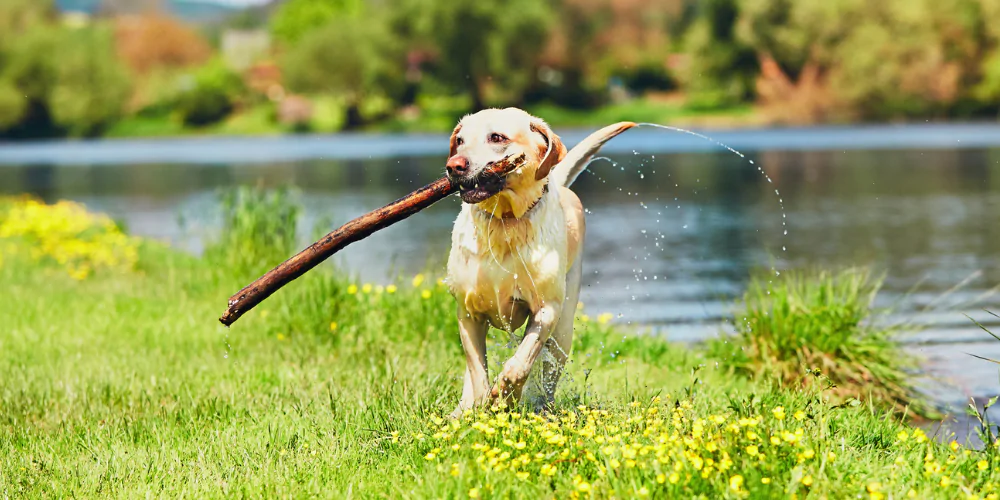
> Dog adventure walks
Head out to forests, national parks, beaches, and dog hiking trails to let your dog explore new sights and smells. Check out the National Trust website to find beautiful, dog-friendly walks near your home.
Minimum age – From six months
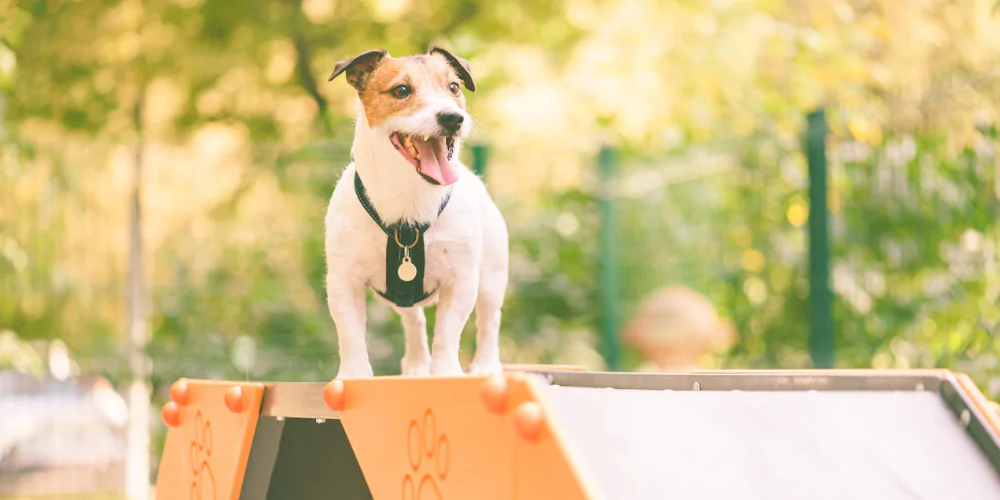
> Dog play parks and fields
Let your dog play, exercise, and train in safe and enclosed spaces across the UK. Dog fields can often be booked in hourly slots and are great for secure group doggy play dates. Places like Dogwood Adventure Play bring even more excitement and stimulation with dog playground equipment, scent work obstacles, and sensory gardens.
Minimum age – From 16 weeks (after second vaccination)
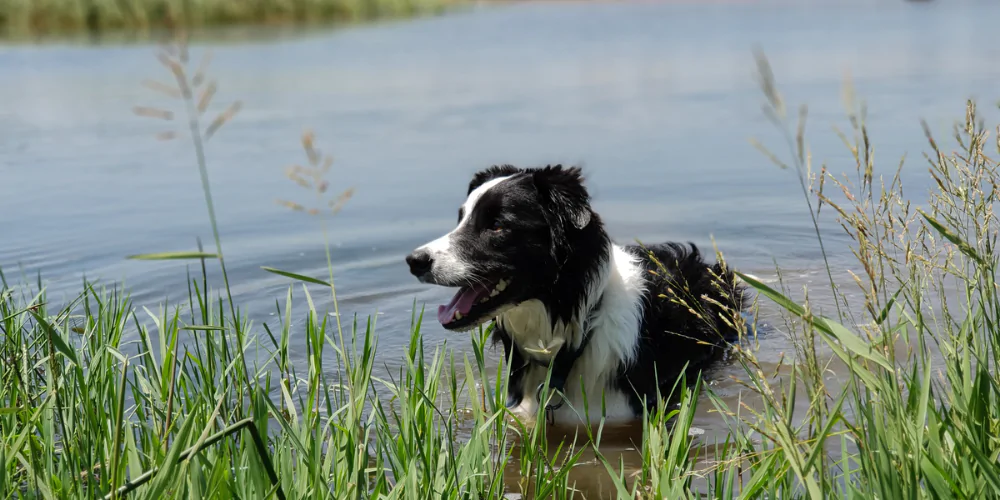
> Dog swimming
Is your dog comfortable with swimming and being in/around water? Have a look online for local ponds and lakes that are safe for your pup to use (no toxic plants or algae). There’s also outdoor pools and lidos you can hire privately or that have dedicated hours for swimming with your dog. Check out a list of dog-friendly swims on The Londog.
Minimum age – From four months
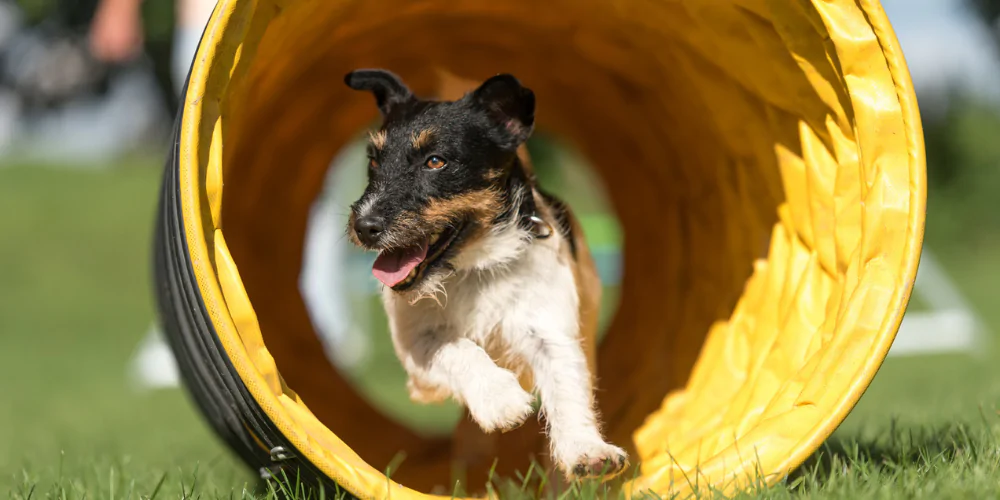
> Dog agility
Dog agility is a sport where you lead your pup through an obstacle course as fast and accurately as possible. There are places that offer agility both competitively and just for fun. For safety reasons, recreational agility places won’t have some of the obstacles you’d find in professional courses.
Minimum age – From 12 months (training)
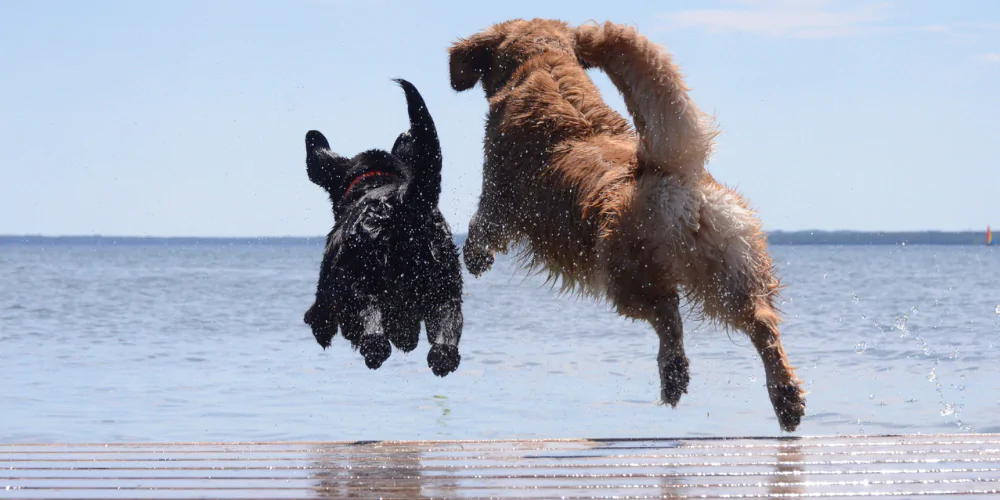
> Dog sports
There’s a huge choice of other dog sports (and you don’t have to do them competitively either). But it might be worth thinking about a professional lesson or two beforehand to get your pup on the right track.
And when it comes to pet insurance for different canine sports, always check your policy wording carefully to see what’s covered. Many sports could be covered if used for fun and enrichment rather than for competing.
Most of these sports are fine for your pup as long as they’re healthy and over six months old. Some of the more challenging sports have higher age limits, so always check eligibility:
- Canicross – off-road running with your dog, this sport is great for giving your pup both mental and physical stimulation. They run out in front of you and follow your directional commands while a bungee cord connects their harness to your waistband. Head over to Canicross UK to learn more.
Minimum age – From 12 months - Disc dog – dogs and their humans compete in a disc throwing competition. There’s different types of competitions, from distance to freestyle catching. Check out the UK Disc Dog Association Facebook page for info.
Minimum age – No official Minimum age, just gauge your dog’s physical abilities - Flyball – a relay racing sport between two teams of four dogs. One dog in each team runs a course full of jumps, triggering and catching a ball at the other end. They then run back to the finish line so the next dog can take their turn. Find out more on the British Flyball Association website.
Minimum age – From 18 months - Dog rally – an obedience-based sport where you lead your dog around a course with different stations. At each station is a sign with an exercise for them to perform. The Kennel Club licences rally events, so your dog will need to be on their Breed Register or Activity Register to take part.
Minimum age – From six months
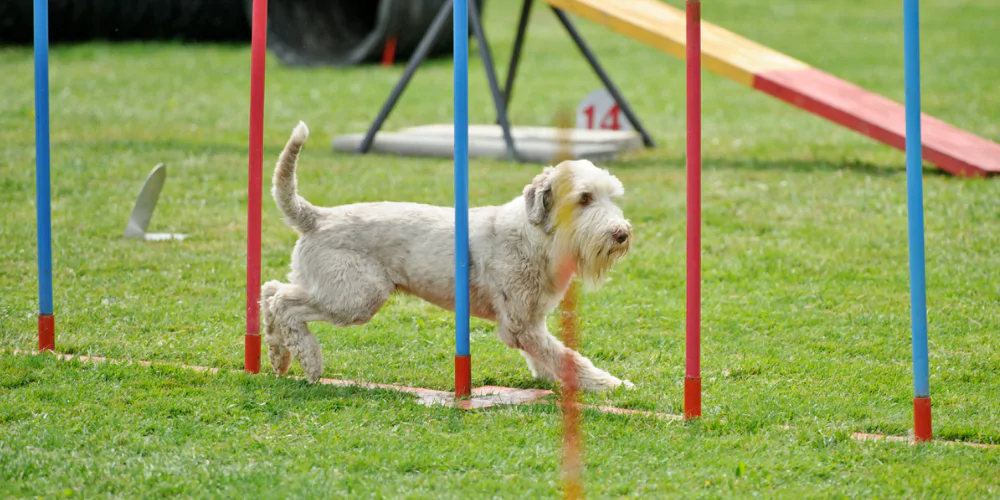
> Dog shows
For the extroverted canines, a day out at a dedicated dog show might just get their tails wagging with excitement. These events often have games, informal competitions, and stands selling lots of goodies for your pup. See if there’s any upcoming events close to where you live at A Doggy Day Out.
Minimum age – From 16 weeks (after second vaccination)
Fun days out and activities to suit specific dog breeds
Want to know which fun activities could stir your dog’s natural instincts and suit their breed traits? We’ve got you covered.
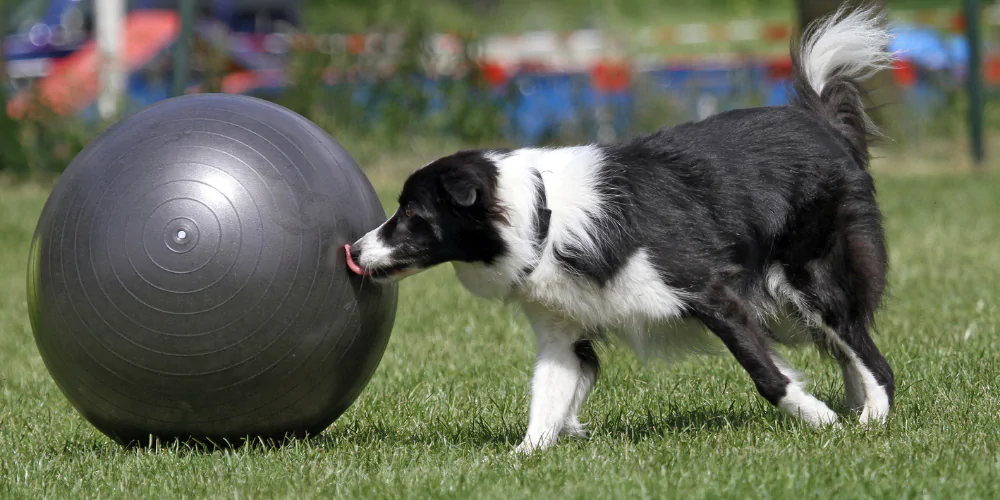
> Activities for herding/pastoral dog breeds
Pastoral breeds are used to being outside and working hard in all of the elements. They’re highly intelligent and need to burn off lots of energy.
A sport like Treibball could be an ideal fit for your pastoral pup as it mimics the skills needed for herding livestock. You and your dog work as a team to push eight balls (set up in a triangular formation) into a goal. There’s a time limit, so speed and accuracy are of the essence.
Minimum age – No official Minimum age, just gauge your dog’s physical abilities
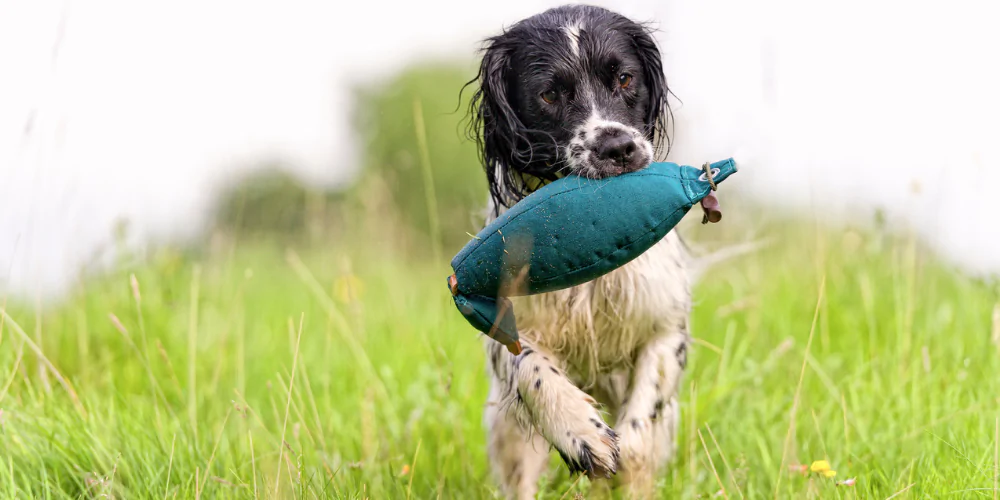
> Activities for gun dog breeds
Bred to find and retrieve live game, gun dogs are energetic and absolutely love to fetch things.
Keep an eye out for gun dog scurry competitions at country shows. A blank shot is fired from a starting pistol and the timer starts when your dog crosses the line. They use their retrieving skills to find and bring back a dummy as quickly as they can.
Minimum age – No minimum age, just gauge your dog’s physical abilities
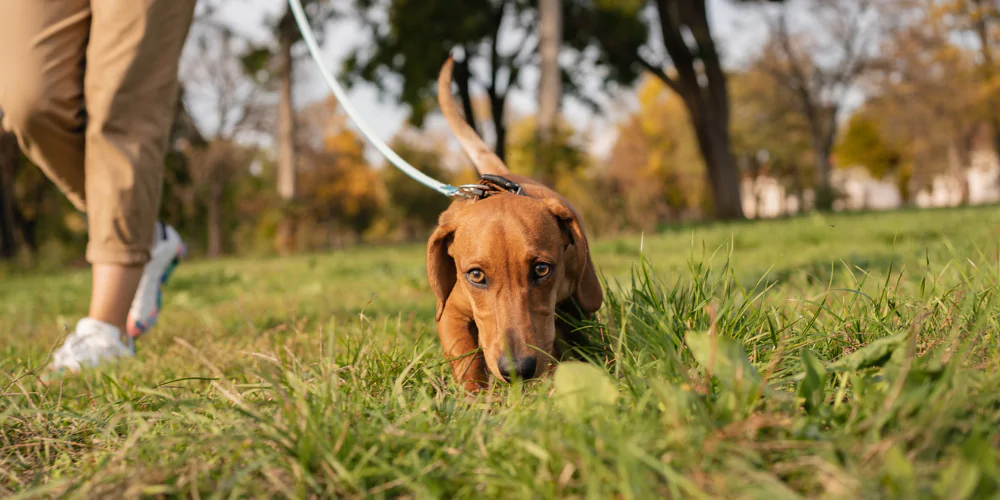
> Activities for hound dog breeds
Hounds were bred to hunt prey using their sense of smell or sight and enjoy a good chase.
Scent work is often a great pick for this breed as it exercises their natural prey drive. Scentwork UK promotes and develops this throughout the country as both a sport and training activity. Many other breeds of dogs also find scent work fun and rewarding.
A lure course is designed specifically for sighthounds like Afghan Hounds and Greyhounds. Lure coursing replicates the hunting live prey but in a humane way. Find out more about lure course with this beginner’s guide from the UK Sighthound Sport.
Minimum age – No minimum age, just gauge your dog’s physical abilities
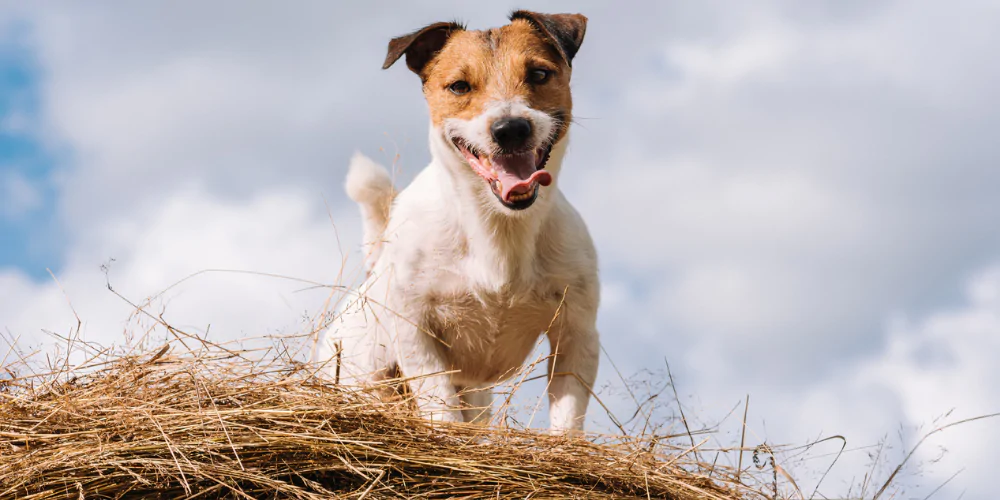
> Activities for terrier dog breeds
Full of personality, terriers were originally bred as pest control for small vermin like rats. Similar to hounds, they love the thrill of a chase and have a high prey drive.
Barn Hunt is new to the UK with taster workshops available soon. The sport recreates a barn environment with tunnels and straw bales to create a simulated rat hunt. Dogs have to use their skills to sniff out hidden surprises with distraction tubes to throw them off track.
The competition uses deceased frozen rats from reptile suppliers and keeps them out of reach of the dogs in plastic tubs.
Minimum age – No minimum age, just gauge your dog’s physical abilities
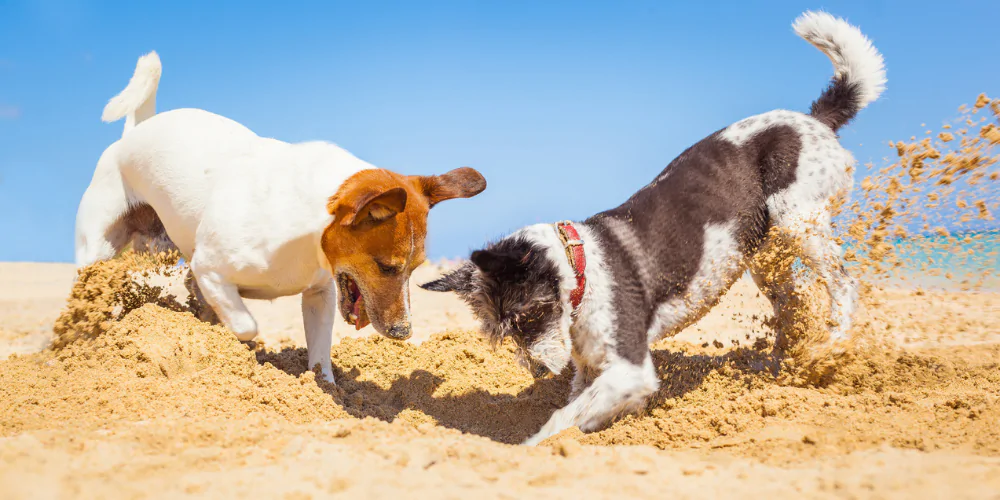
Fun ideas for your older dog’s day out
Your older dog can still have plenty of fun in their twilight years. It just means choosing activities that don’t exhaust them or put too much strain on their body. And always check with your vet before introducing your senior pup to a new sport or activity:
- Swimming – a joint-friendly exercise, your pup may love a visit to a local doggie pool or dog-safe pond. Keep them at the shallow end and use a life vest for safety.
- Trip to the beach – your dog can either swim or simply paddle at the water’s edge. They may just enjoy the feeling of soft sand between their pads (as long as it’s not a hot day).
- Lunch at a doggie bakery – if there’s not one nearby, lots of normal cafes also sell puppuccinos. Just remember to keep in mind your dog’s dietary needs.
- Dog hikes – look for areas where the terrain is flatter and the routes are shorter. This allows your pup to explore without over-exerting themselves.
- Car ride – some dogs just love spending time in the car, watching the world go by as you drive around. Always secure them with a harness or dog seat.
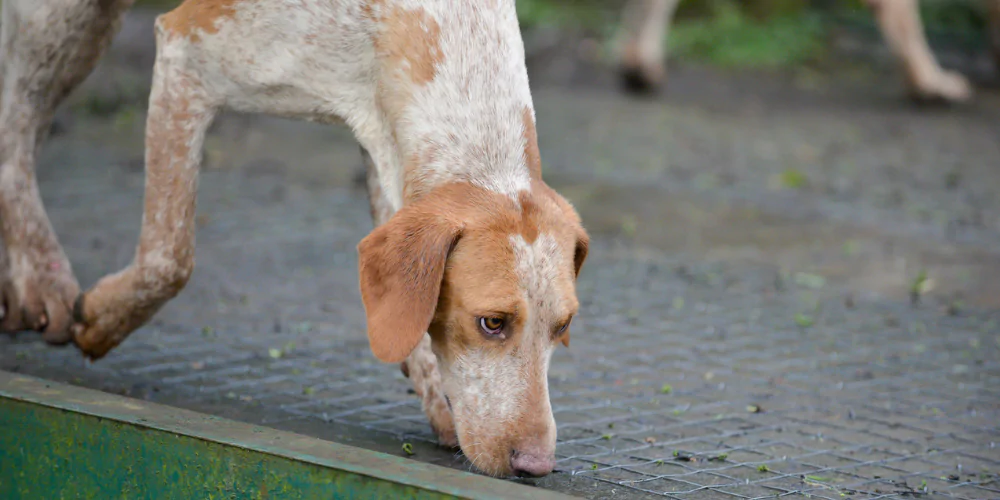
Fun ideas for your deaf or blind dog’s day out
One of the biggest challenges of taking your blind or deaf dog out is making sure they’re having fun while staying safe. You’re also looking for activities which challenge their other senses, especially their sense of smell.
Some fun ideas include:
- Scent work games – both deaf and blind dogs can enjoy doing scent work.
- Flyball and agility – this is more for deaf dogs once they’ve been trained in visual cues.
- Playdates with other dogs – book a secure dog field and enjoy with familiar dogs to help build up their confidence.
- Walks in open spaces – parks and beaches give your dog plenty of room to explore safely without things getting in the way.
Make sure your dog can be covered for the unexpected with dog insurance from Petsure.


